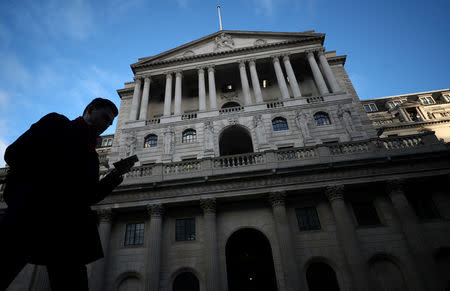Bank of England says it is watching mortgage price war 'like a hawk'
By Huw Jones
LONDON (Reuters) - Regulators are watching a price war in mortgages "like a hawk" and may need to impose stricter minimum capital requirements on lenders, Bank of England Deputy Governor Sam Woods said on Friday.
The price war over the past two years may be good news for consumers wanting to buy their first home, but it was less good for a bank or building society concentrated in mortgages, Woods told the Building Societies Association.
High loan-to-value ratios and higher loan-to-income home loans can be well captured by the BoE's capital requirements.
"But we should be watching them like a hawk," Woods said.
Falling capital levels have been seen at lenders who use their own computer models to work out the riskiness of loans on their books and therefore how much capital to hold.
"The amount of capital being set aside to cover mortgages has been falling," Woods said.
The BoE's supervisors were making strenuous efforts to check on how models are being used.
"Still, I think we should approach this trend with a very sceptical eye and need to consider whether there is a case to impose more floors in firms’ models, particularly given the current stretch in some measures of house price valuation," Woods said
(Graphic - BOE high loan to value chart, https://tmsnrt.rs/2X3xkZl)
RING FENCE FACTOR
Woods' warning comes after the Bank forced Metro Bank to correct how much capital it was setting aside to cover mortgages after under-reporting the risk from its loan book.
Metro raised 375 million pounds to bolster its capital buffers earlier this month.
Tesco Bank said this week it was quitting home lending due to tough competition, and Nationwide Building Society its measure of underlying profitability fell in the year to April 4.
Credit ratings agency Fitch has said that rules requiring big banks to "ring fence" their retail arms with capital have led to increased competition as lenders seek to boost revenues.
Europe's biggest bank HSBC has renewed its focus on home loans to boost revenue in its ring-fenced arm.
Asked if ring-fencing was to blame for the price war, Woods said: "Everyone involved agrees to some extent that that has been a factor in the intensification of pressure in the mortgage market."
"We don't think it's the dominant factor. We think that the effect so far is manageable," Woods said, adding that his staff were seeking to measure the impact of ring-fencing.
The regulatory system is also unable to properly capture risks from margin loans, or loans are granted using shares held by the borrower as collateral, Woods said.
Banks in London lost more than a billion euros in a single deal in 2017, Woods said.
Britain's departure from the European Union could give Britain more leeway to adapt rules that are currently written in Brussels.
"My view is that a simpler system of regulation for smaller firms would be a good thing," Woods said.
(Reporting by Huw Jones)

 Yahoo Finance
Yahoo Finance 

